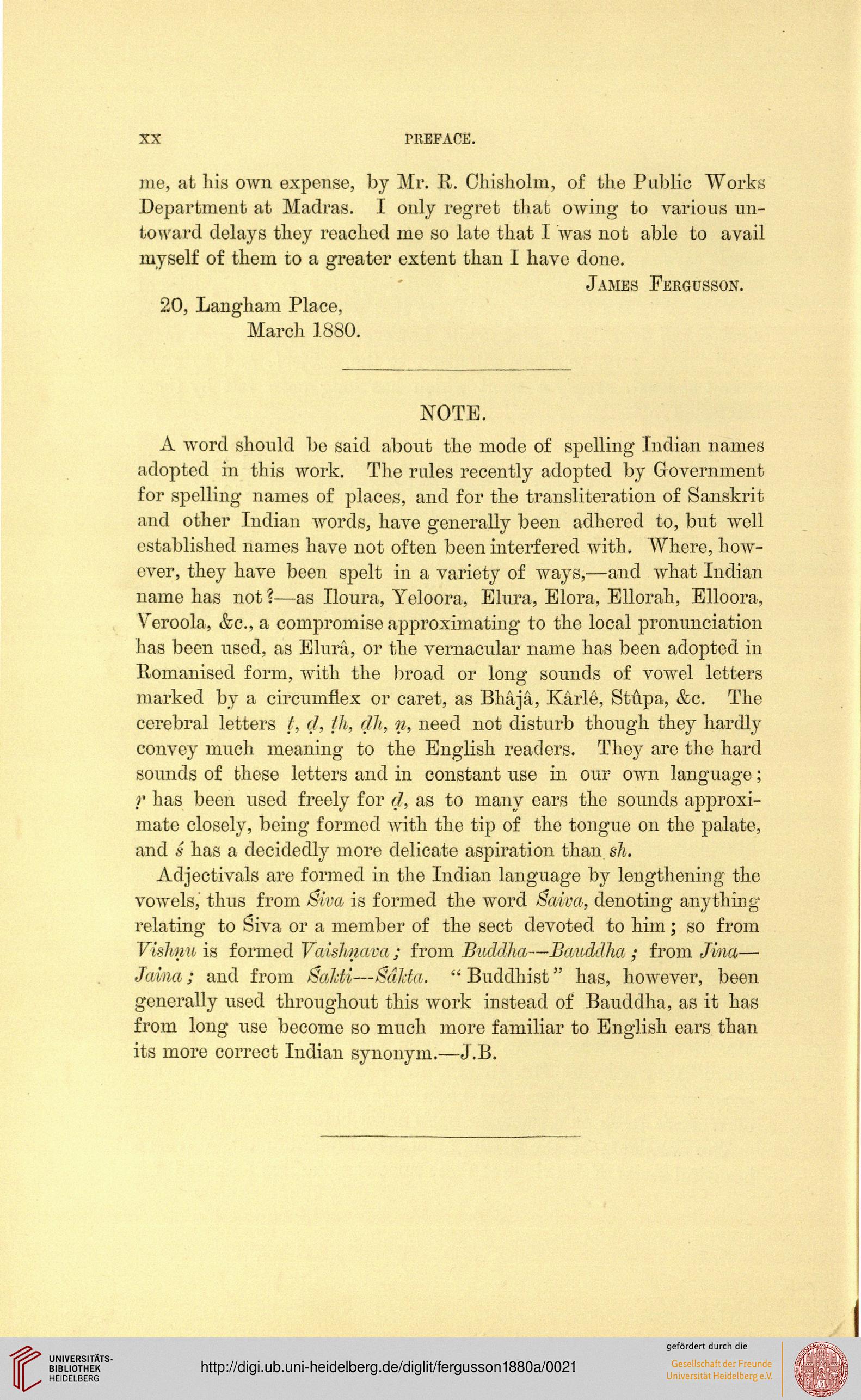XX PREFACE.
me, at his own expense, by Mr. R. Chisholin, of the Public Works
Department at Madras. I only regret tkat owing to various un-
toward delays tkey reached me so late that I was not able to avail
myself of thern to a greater extent tkan I have done.
James Fergusson.
20, Langham Place,
March 1880.
NOTE.
A word should be said about the mode of spelling Indian names
adopted in this work. The rales recently adopted by Government
for spelling names of places, and for the transliteration of Sanskrit
and other Indian words, have generally been adhered to, but well
established names have not often been interfered with. Where, how-
ever, they have been spelt in a variety of ways,—and what Indian
name has not ?—as Iloura, Yeloora, Elura, Elora, Ellorah, Elloora,
Veroola, &c, a compromise approximating to the local pronunciation
has been used, as Elura, or the vernacular name has been adopted in
Romanised form, with the broad or long sounds of vowel letters
marked by a circumflex or caret, as Bhaja, Karle, Stivpa, &c. The
cerebral letters t, d, fh, dh, n, need not disturb though they hardly
convey much meaning to the English readers. They are the hard
sounds of these letters and in constant use in our own language;
r has been used freely for d, as to many ears the sounds approxi-
mate closely, being formed with the tip of the tongue on the palate,
and s has a decidedly more delicate aspiration than sh.
Adjectivals are formed in the Indian language by lengthening the
vowels," thus from Swa is formed the word Sa/iva, denoting anything
relating to Siva or a member of the sect devoted to him; so from
Vishnu is formed Vaishnava ; from Buddha—Bauddha ; from Jina—
Javna; and from iSaMi—£dlda. " Buddhist" has, however, been
generally used throughout this work instead of Bauddha, as it has
from long use become so much more familiar to English ears than
its more correct Indian synonym.—J.B.
me, at his own expense, by Mr. R. Chisholin, of the Public Works
Department at Madras. I only regret tkat owing to various un-
toward delays tkey reached me so late that I was not able to avail
myself of thern to a greater extent tkan I have done.
James Fergusson.
20, Langham Place,
March 1880.
NOTE.
A word should be said about the mode of spelling Indian names
adopted in this work. The rales recently adopted by Government
for spelling names of places, and for the transliteration of Sanskrit
and other Indian words, have generally been adhered to, but well
established names have not often been interfered with. Where, how-
ever, they have been spelt in a variety of ways,—and what Indian
name has not ?—as Iloura, Yeloora, Elura, Elora, Ellorah, Elloora,
Veroola, &c, a compromise approximating to the local pronunciation
has been used, as Elura, or the vernacular name has been adopted in
Romanised form, with the broad or long sounds of vowel letters
marked by a circumflex or caret, as Bhaja, Karle, Stivpa, &c. The
cerebral letters t, d, fh, dh, n, need not disturb though they hardly
convey much meaning to the English readers. They are the hard
sounds of these letters and in constant use in our own language;
r has been used freely for d, as to many ears the sounds approxi-
mate closely, being formed with the tip of the tongue on the palate,
and s has a decidedly more delicate aspiration than sh.
Adjectivals are formed in the Indian language by lengthening the
vowels," thus from Swa is formed the word Sa/iva, denoting anything
relating to Siva or a member of the sect devoted to him; so from
Vishnu is formed Vaishnava ; from Buddha—Bauddha ; from Jina—
Javna; and from iSaMi—£dlda. " Buddhist" has, however, been
generally used throughout this work instead of Bauddha, as it has
from long use become so much more familiar to English ears than
its more correct Indian synonym.—J.B.




